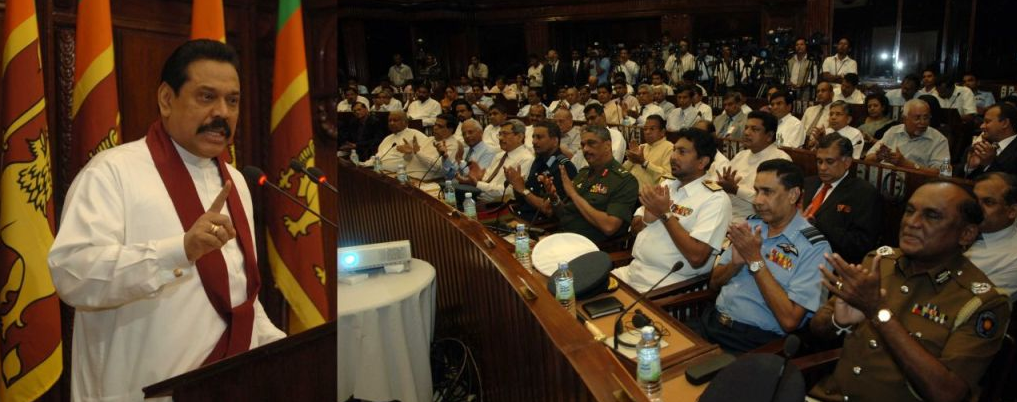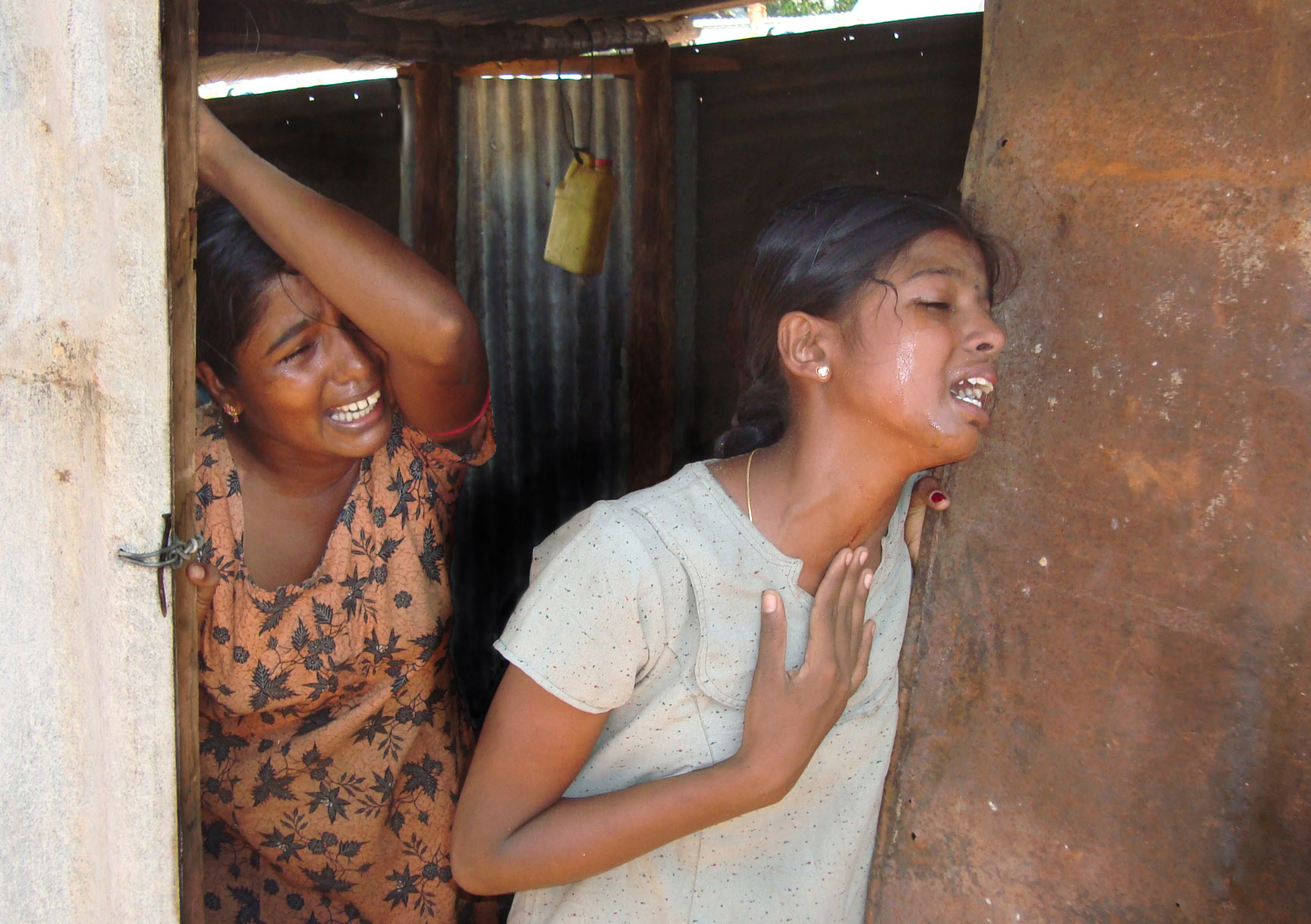
In many ways it has been a bad few weeks for the Rajapaksa regime on the international stage. But then they are used to that. Internationally they respond to criticisms with a combination of denial, prevarication – and by offering endless, largely phoney, inquiries and promises of action.
Domestically they portray these criticisms of their appalling human rights record as attacks on the nation of Sri Lanka – and by extension as attacks on the Sinhala majority from which they draw their support.
But all the while they continue with their programme of repression of the Tamils, of the north and east – and their assaults on the fundamentally Tamil identity of the region through land-grabs, ethnic re-engineering, sexual violence, the cynical use of Sinhala families as an ethnic "plantation" and the economic marginalization of the local Tamil population. In alignment with that they also "encourage" the growing tide of Sinhala ultra-nationalism which finds its clearest expression in the saffron-robed thugs of the Bodu Bala Sena and their racist ideology – now also directed at Muslims and Christians.
And that is the key problem for the international community and for human rights defenders – both internationally and from all communities within Sri Lanka. There is no time to waste. The Rajapkasas believe that if they can delay long enough, they will achieve what they want in the north and east – and wear down the resolve of the international community to act on their historic war crimes.
So will they succeed?
One hopes not. On the face of it – and indeed in reality – they are under increasing pressure.
Last month in his oral report on the progress of the UN inquiry, the High Commissioner for Human Rights made some pretty devastating criticisms. He said he was "shocked" by the "ongoing campaign of threats, harassment, intimidation and reprisals by both state and non-state actors since March against civil society groups, human rights defenders and victims' organisations, including those who might support or engage with the international inquiry."
He singled out for criticism the threat by the Sri Lankan Minister of Mass Media and Information that the Government would "take legal action against those who testify before the OHCHR investigation if the evidence submitted by them was in violation of the county's Constitution." He cited the attacks on civil society meetings, and the banning of Tamil organisations as unacceptable.
Lack of progress on witness protection also came under fire as did the inaction on everything from the Trinco Five to the promised investigation into the revelations made in our Channel 4 films. Land grabs and militarization were also attacked (though he curiously omitted to mention that these events were clearly focused on Tamil areas).
Over the last two days many of those criticisms have been echoed at hearings of the UN Human Rights Committee (UNHRC), reviewing Sri Lanka's adherence to the International Covenant on Civil and Political Rights (ICCPR).
But despite these criticisms the government continues to present itself as the wronged victim of a Western witch-hunt.
That is of course transparently hypocritical, given their enthusiastic adoption, when it suits them, of the West's language of the "war on terror". And in fact this ploy of looking to the global south for support against what they try to portray as "western" pressure has, with some exceptions, been pretty much of a failure. Huge resources have been spent on an expensive drive to win Africa over – with minimal success.
On the other hand the government recently made much of a statement issued by that well known friend of progress and democracy, the government of Egypt, which led 22 countries in the "like minded group" in condemning the UN inquiry into the events in Sri Lanka, describing them as "unwarranted".
But their apparent delight over this report was rather undermined two days later when Sri Lanka's former Permanent Representative to the UN in Geneva, Dr. Dayan Jayatilleka, pointed out that in fact the statement suggested support for Sri Lanka is "hemorrhaging" at the UN Human Rights Council.
Five years ago – immediately after the end of the war – the Rajapaksa regime pulled off a stunning coup when it gained 29 votes for a resolution congratulating them on their "victory". Even in March this year they could point to 12 members of the UNHRC who voted against the resolution setting the inquiry up. But now – of those countries in the "like minded group" who condemned the UN enquiry as unwarranted – only seven were on the UNHRC.
Jayatilleka added that the key issue for the Rajapaksas was not just the small number of UNHRC members which supported them – but which countries did NOT sign.
"I'm not talking about the Western nations – but member states that should have signed this," he said. "For instance Vietnam has not signed this, India has not signed, Brazil has not signed, South Africa has not signed."
But does Sri Lanka really care about this? Possibly not – they are not trying to win this propaganda war – they know they can't. Instead they are trying to buy time. And they are past masters of that.
To do this they will use every weapon in the book, from pandering to China's need to establish its new maritime silk road, to exploiting India's fear of its own Tamils and guilt over its own shady record on human rights.
There is no limit to their political shamelessness. They will point quite correctly to the hypocrisy of the west – an illegal war in Iraq for example – but will relish any photo-opportunity to capture Rajapaksa and Obama in the same frame.
They will look the other way while the BBS launch violent attacks on Christian churches, (or dismiss them as merely the "natural consequences" of a "multi-ethnic" society), while falling over themselves to run pictures of Mahinda or Gotabhaya simpering sycophantically in the company of the Pope.
And that represents the real challenge for those who believe in human rights and political solutions to historic injustices in Sri Lanka. The Rajapaksas believe they can bluff this one out – but they know it is touch and go.
Some good things are happening. The UN's inquiry is no panacea, but it is an important step. But if that progress is not to be wasted, then no-one should be allowed to think this is an academic exercise in eventual accountability. There is no time to waste. The search for justice, truth and accountability in Sri Lanka is an urgent priority.





